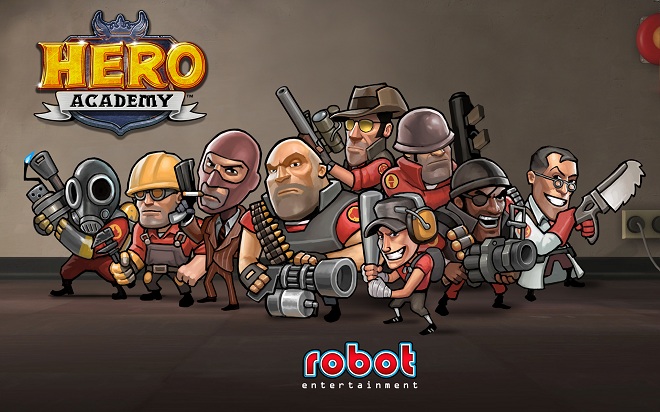Hero Academy is a deceptively simple strategy game: Players choose from a growing faction of teams, most reflecting common archetypes from the fantasy genre (like knights, elves, orcs and dwarves), and battle it out on a square-tile grid. Players take their turns asynchronously, meaning that people can pick up and play anytime they wish.
But when it comes to developer Robot Entertainment marketing their popular free-to-play iOS title on other platforms and countries, “simple” would be the wrong word to use.
Last week Yodo1, a Beijing-based company that works with Western developers to localize their games for the Chinese market, announced a partnership with Robot Entertainment to bring Hero Academy to China, along with an exclusive team featuring Shaolin monks. And just a day later, Robot Entertainment revealed that Hero Academy will be coming this year to developer Valve’s digital distribution platform Steam on August 8, with another exclusive team composed of characters from Valve’s free-to-play multiplayer shooter Team Fortress 2.
We recently had a chance to conduct a brief interview via email with Patrick Hudson, Robot Entertainment’s chief executive, to see what exactly was the thought process behind their recent game-changing moves.
GamesBeat: One of the reasons that the iOS version of Hero Academy became so popular is because it’s free-to-play. It’s certainly what hooked me in and encouraged me to spend money on additional teams. Will there be no free-to-play version of the game on Steam? If not, why?
Patrick Hudson: The Steam version will not be free. First, it’s important to remember that the free version on iOS was supported by advertisements. On Steam, your purchase of the game will give you both the Team Fortress 2 and Council teams. Additionally, that purchase will give you access to everything you may have paid for on iOS. So, if you bought the other three teams (Dark Elves, Dwarves, Tribe) you’ll have them available on Steam without repurchase.
Steam players will also unlock several vanity items that can be used inside Team Fortress 2 itself. So, we think and hope that we’re offering extraordinary value for purchasing the Steam version. Beyond all of that, the Steam version and Team Fortress 2 [content] development was a significant investment for our studio.
GamesBeat: How did the partnership and crossover with Valve come about? Was it something that you wanted to do all along?
Hudson: Valve actually approached us. Some of the guys on the Team Fortress 2 development team were playing Hero Academy and enjoying it, and they had the idea of a Team Fortress 2 team in Hero Academy and bringing it to Steam. Being huge fans of both Valve and Team Fortress 2, it was obviously an extremely exciting opportunity — not to mention very flattering to be trusted with their IP [editor’s note: intellectual property] in such a way. The decision was made quickly, and we got to work on it.
GamesBeat: Correct me if I’m wrong, but I can’t think of any other games on Steam that have cross-platform multiplayer between PC and iOS devices. Is Hero Academy the first to take advantage of this?
Hudson: We think Hero Academy is the first game to be cross-playable on Steam and iOS. We love Steam as a platform. Our first game, Orcs Must Die, saw great success on Steam. And, with Hero Academy being a somewhat core gaming experience, we felt like it would appeal to Steam players.
Just for ourselves as players of our own game, we like the idea of having a windowed version of Hero Academy up on our PCs all day.
GamesBeat: Between this announcement and the recent unveiling of Hero Academy heading to China with the help of Yodo1, Robot Entertainment’s flexibility when it comes to marketing the game has been really impressive. What was the design philosophy for these decisions? And if the game were to be localized for other territories, could we expect similar exclusive teams?
Hudson: When we have success with any [one] of our games, we want to be aggressive in bringing it to different audiences on different platforms. And the opportunities in both China and with Team Fortress 2 were born out of other people enjoying Hero Academy. So, the design decisions are really more reactive rather than proactive. With China, we were seeing significant downloads yet little resultant revenue. It’s a market that can be hard for Western developers to find success.
We knew there was a big opportunity there for Hero Academy, but we also knew we couldn’t fully realize it without some help. Yodo1 came to us with some great ideas for how to adapt the game and hopefully better reach Chinese players. They understood the game design deeply and how it might be adapted while respecting its core.
It’s not out of the question, but it seems unlikely we’d pursue similar exclusive teams on a regional basis. China is just a unique market that often demands a unique approach.
VentureBeat's mission is to be a digital town square for technical decision-makers to gain knowledge about transformative enterprise technology and transact. Learn More


